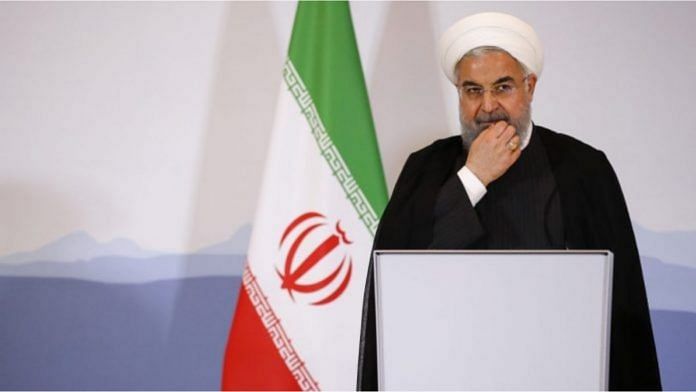Iran secured a significant diplomatic victory on Sunday when the United Nations arms embargo, imposed in 2007 over concerns about Tehran’s nuclear program, expired. Efforts by the Trump administration to extend it in the Security Council ended in an embarrassing American failure, as did the effort to invoke the grievance mechanism within the 2015 nuclear deal.
The Islamic Republic’s beleaguered President Hassan Rouhani cited the expiration of the embargo as a major accomplishment of the nuclear agreement. At least in theory, Iran is now back in the market to buy and sell conventional weapons. Russia and China are eager to supply it with advanced jets, tanks and missiles.
This is alarming for its Gulf Arab neighbors, and especially for its primary adversaries, Saudi Arabia and the United Arab Emirates. They will be tempted to enter an arms race with Iran, using their deeper pockets — and easy access to American weapons systems — to maintain their substantial technological edge over Tehran. It has been suggested that the UAE’s eagerness to acquire F-35 jets, for instance, anticipates the Iranian purchase of new planes to update its air force.
But the greatest threat to Iran’s neighbors will come, not from any big-ticket spending by Tehran, but from its acquisition of technologies that enhance the its homemade weapons. State-of-the-art targeting and guidance systems for missiles and drones can help Iran inflict more damage than planes and tanks.
If the Russians and Chinese are willing to brave American sanctions — and give a cash-strapped Tehran very generous terms — it is conceivable that the Iranians will order jets and heavy armor. The Islamic Revolutionary Guard Corps hasn’t been able to import advanced hardware in decades.
It may not be possible to prevent Iran from following Turkey in acquiring the Russian S-400 missile-defense system, which would be a significant upgrade from its existing S-300s. Moscow will likely argue that the S-400 is defensive, and therefore represents no threat to Iran’s neighbors. (The Russians are keen to sell it to Gulf Arab countries, as well.)
But defensive weapons such as missile-defense systems form a part of an overall integrated military structure, and as significant for offensive as defensive actions. Upgrading its capabilities in this area would greatly strengthen Iran’s strategic position. Even more alarming for the Arab states are prospects of Iran acquiring new offensive missiles and drones. Presumably, a great deal of American effort, whether diplomatic or punitive, will be directed at preventing this.
But in the medium-term, the greatest threat would come from relatively small purchases of precision-guidance technology, to greatly upgrade Iran’s domestic production. Many of Iran’s home-made missiles are based on models acquired from North Korea; these have been significantly altered and, in some cases, improved by Iranian engineers. Iran has also developed substantial drone-making capabilities.
Its enemies have already experienced the potency of these missiles and drones, whether executed by the IRGC or its proxy militias in the Middle East. The most dramatic demonstration came in the missile-and-drone swarm attack against Saudi oil installations last year. Now imagine how much more mayhem might be unleashed if those firing off the missiles and drones had better guidance and targeting technology.
In all of this, the first line of defense for the Gulf Arab states will be the U.S. Treasury’s secondary sanctions on companies, and possibly even countries, engaging in major weapons deals with Tehran. But Iran’s neighbors will also want to be forearmed against the new threats.
While the question of F-35 sales to the UAE has made the headlines recently, the real game-changer in the current proposed package from Washington is the EA-18G Growler, which comes with the latest electronic-warfare technology, including jamming pods and communication countermeasures. This is the kind of weapon Arab states will hope to deploy against more sophisticated Iranian attacks.
But the best way for the Saudis and Emiratis to respond to an Iran armed with more potent conventional weapons to work with the U.S. to create an effective secondary sanctions regime: The Treasury Department will do the heavy lifting, but they can help by refusing to cooperate with entities and individuals that go too far in arming their enemy. They should press China, Russia and former Soviet against providing Tehran with greatly expanded conventional firepower.
The would also be wise to find a way to end their quarrel with Qatar and present a more unified Gulf Arab front. If they’re willing to be more ambitious, they should create a collective Gulf Arab missile-defense system. And, of course, the whole point of a robust military stance is to facilitate effective diplomacy with adversaries.
All of this can be achieved without an indiscriminate, wasteful arms race. -Bloomberg
Also read: Iran and Russia making attempts to interfere with presidential election, US official warns




Brainless spoiled corrupt gulf Arabs can’t compete with the intelligent stoic Persians. Try writing another more convincing article, Mr. Ibish.